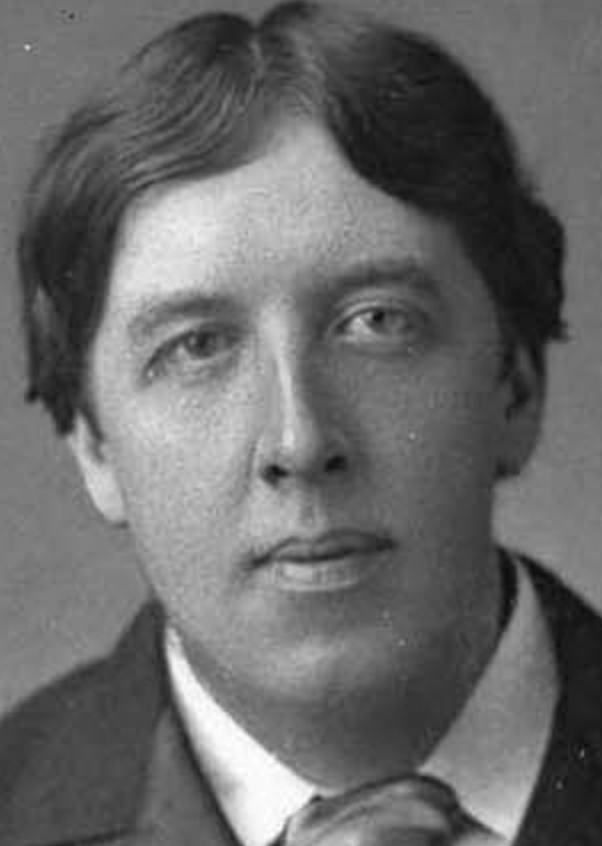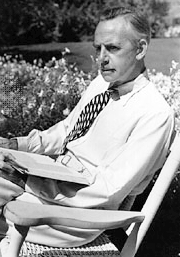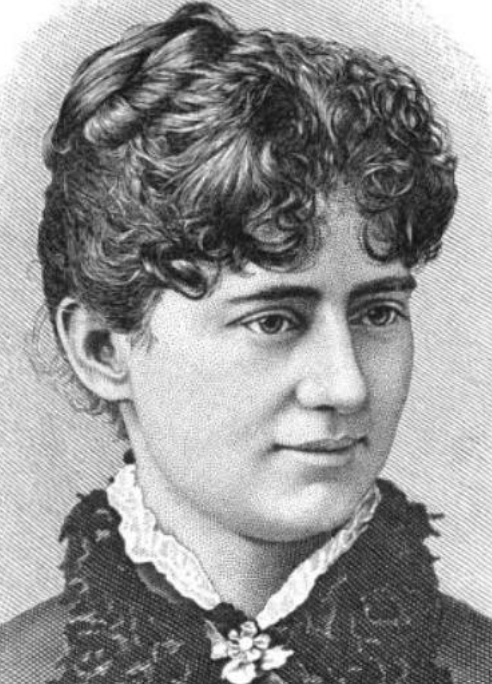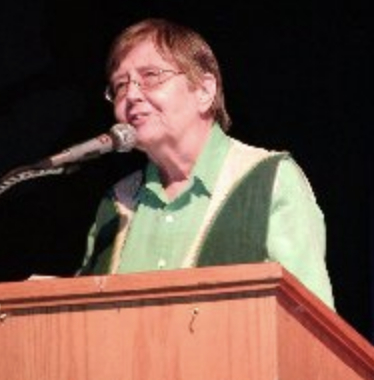October 16
Oscar Wilde

On this date in 1854, writer Oscar Wilde was born in Ireland. He studied at Trinity College on a scholarship. In 1874 he was awarded a scholarship to Oxford. His first book of poems was published in 1881 and he spent a year lecturing on aesthetics in the United States. Wilde married in 1884 and fathered two sons, working for a magazine and writing children’s stories. His only novel, The Picture of Dorian Gray, was published in 1890. This was followed by his successful plays: “Lady Windermere’s Fan“ (1892), “A Woman of No Importance” (1893), “Salome” (1894), “An Ideal Husband” (1895) and “The Importance of Being Earnest” (1895).
In 1895 he sued the father of his male lover for libel after Wilde was accused of homosexuality. Wilde dropped the ill-advised lawsuit but was then charged criminally and convicted of gross indecency and sentenced to two years’ hard labor. His health was broken by the ordeal. He wrote “The Ballad of Reading Gaol” about it in 1898. Penniless, he moved to the continent, where he died of meningitis at age 46. On his deathbed, the lifelong skeptic, who had written “it is better for the artist not to live with popes,” (“The Soul of Man Under Socialism”) converted to Catholicism, a gesture perhaps imputed to his brain condition.
A master of the epigram, Wilde is known for such one-liners as “To love oneself is the beginning of a life-long romance.” “I think that God in creating Man somewhat overestimated his ability.” “The only way to get rid of a temptation is to yield to it.” “He hasn’t a single redeeming vice.” “There is only one thing in the world worse than being talked about, and that is not being talked about.” He reputedly said on his deathbed, “Either that wallpaper goes or I do.”
In his review of “Oscar Wilde: A Life” by Matthew Sturgis, David Hare wrote: “Those of us who love him are most moved by his generosity. He really did give extravagant sums of money to every beggar he passed, and was bewildered when, in his last years, acquaintances did not show him the same largess he had once extended to strangers. The act of exercising practical, daily kindness was at the heart both of his beliefs and of his way of life.” (New York Times, Oct. 13, 2021)
Hare added, “He brought to literature a liberating philosophy that struck hard at Victorian society, but also at our own. He did not believe that morality consisted of judging other people’s faults. He believed it consisted in judging your own.”
Of religion he wrote in “The Critic as Artist” in 1891: “A thing is not necessarily true because a man dies for it.” “Truth, in matters of religion, is simply the opinion that has survived.” “There is no sin except stupidity.” (D. 1900)
"Science is the record of dead religions."
— Wilde, "Phrases and Philosophies for the Use of the Young" (1894)
Eugene O’Neill

On this date in 1888, Eugene O’Neill was born in New York City in a hotel on Broadway, the third son of popular actor James O’Neill. As a youngster he traveled with his father, then was sent to a Catholic boarding school. O’Neill entered Princeton in 1906. After he was expelled he set off on adventures prospecting for gold in Honduras, working as a sailor and a variety of other jobs. While recovering from a bout of tuberculosis, O’Neill, influenced by his reading of Ibsen and other dramatists, determined to become a playwright.
He won the Nobel Prize for Literature in 1936 and four Pulitzer Prizes for Beyond the Horizon (1920), Anna Christie (1922), Strange Interlude (1928) and Long Day’s Journey into Night, written in 1939 but awarded posthumously in 1957. Some of his other works include Mourning Becomes Electra (1931), Ah, Wilderness! (1933), The Iceman Cometh (1936) and A Moon for the Misbegotten (1943).
O’Neill had three wives and three children before dying at age 65 after years of poor health exacerbated by alcoholism. He died in Room 401 in the Sheraton Hotel in Boston. According to biographer Louis Scheaffer, his whispered last words were “I knew it. I knew it. Born in a goddamn hotel room and dying in a hotel room.” (D. 1953)
"When I’m dying, don’t let a priest or Protestant minister or Salvation Army captain near me. Let me die in dignity. Keep it as simple and brief as possible. No fuss, no man of God there. If there is a God, I’ll see him and we’ll talk things over."
— O'Neill's instructions to his wife Carlotta, "O'Neill: Son and Artist" by Louis Scheaffer (2002)
Lilian Leland

On this date in 1857, Lilian Leland was born in the United States. The daughter of freethinkers, she traveled 60,000 miles alone around the world at the age of 25 for nearly two years, starting with a voyage around Cape Horn. Her mother, Mary A. Leland, was one of the first women to study medicine in the U.S. and lectured on anatomy as early as 1852. Her father, Theron C. Leland, was a popular lecturer in the Liberal League. Leland was brought up to play chess and read widely, conceiving her plan to travel after reading “The Merchant of Venice.” She wrote a book, Traveling Alone: A Woman’s Journey Around the World, and married the son of Stephen Pearl Andrews, abolitionist and freethinker.
Samuel Porter Putnam described her as “Always pleasant and cheerful in appearance, and never, under any circumstances, uttering a complaint, she is, at the same time, possessed of a quiet determination that carries her smilingly and safely over all difficulties.” (“400 Years of Freethought,” 1894)
Leland died in Queens, New York, from pneumonia at age 76. (D. 1934)
“The studied atrocities that the Catholics and Protestants have inflicted on each other in the past ages, in the name of a ‘Merciful God’ exceed everything the world has ever seen in simple savage fiendishness, and an all-powerful being who has stood calmly by and permitted the torture and massacre of his own chosen children and chosen prophets, not to mention the thousands of unfortunate women and children, is — well, he is not the kind of God that I want to worship, and I don’t think either ‘merciful’ or ‘just’ are exactly the adjectives that should apply to him.”
— Leland, "Traveling Alone: A Woman's Journey Around the World" (1890)
Mary Daly

On this date in 1928, Mary Daly was born in Schenectady, N.Y. She graduated from the College of Saint Rose in Albany in 1950 with a degree in English and Latin. She obtained her M.A. in English from the Catholic University of America in 1952, her Ph.D. in theology from Saint Mary’s College in 1953, and Ph.D.s in theology and philosophy from the University of Fribourg in Switzerland in 1963 and 1965. She was one of the first American women to earn a degree in theology from a Catholic college.
Daly was a radical feminist and theologian who taught feminist theology and ethics at Boston College from 1966 to 1999. She published eight books, including Gyn/Ecology: The Metaethics of Radical Feminism (1978) and Pure Lust: Elemental Feminist Philosophy (1984).
In 1968, Daly wrote The Church and the Second Sex, a book examining the harm of the Catholic Church on women. “A woman’s asking for equality in the church would be comparable to a black person’s demanding equality in the Ku Klux Klan,” Daly wrote. She later called the book “a celebration/cerebration of my departure from the catholic church in particular and christianity in general” in her introduction to the 1985 edition of The Church and the Second Sex.
She was briefly denied tenure from the Jesuit Boston College due to the book’s content. “If God is male, then male is God. The divine patriarch castrates women as long as he is allowed to live on in the human imagination,” Daly is quoted as saying in Castrates: Webster’s Quotations, Facts and Phrase, published in 2009.
Daly once urged people to sin: “But not against these itty-bitty religions, Christianity, Judaism, Islam, Hinduism, Buddhism — or their secular derivatives, Marxism, Maoism, Freudianism and Jungianism — which are all derivatives of the big religion of patriarchy. Sin against the infrastructure itself!” (National Catholic Reporter, Jan. 4, 2010)
She died in Gardner, Mass. at age 81. (D. 2010)
" 'God’s plan’ is often a front for men’s plans and a cover for inadequacy, ignorance, and evil."
— Daly, "Beyond God the Father: Toward a Philosophy of Women's Liberation" (1973)
